LimeLeads Alternatives
Switching from LimeLeads? Discover 10 alternatives. We compare features, data accuracy, and pricing to help you decide.

You might have used LimeLeads for good reasons. It performs well when you need a database of local businesses. The tool helps find specific company contacts quickly, which is a clear plus for targeted outreach.
However, some users note its data can be outdated or find its features limited. This might lead you to look for an alternative. We've analyzed the best options against LimeLeads, using G2 reviews, to help you shortlist a replacement. Let's get started.
Consider 11x for Your Sales Team
If your sales process could benefit from automation, consider digital workers. 11x provides them to handle tasks like lead research and outreach. This frees up your team to focus on deal closure. You can explore how they might fit into your current workflow.
11x is a GTM platform where our AI agents manage your sales process. Alice finds prospects, conducts outreach on email and LinkedIn, and maintains your CRM. Julian qualifies inbound leads and books meetings.
This approach replaces the need for separate tools for data enrichment, outreach, or email warmup. We unify these functions into a single platform.
LimeLeads Alternatives
Below, we review the top LimeLeads alternatives. We will analyze each option's pricing, core features, and specific advantages and disadvantages to help you make an informed choice.
1) ZoomInfo SalesOS
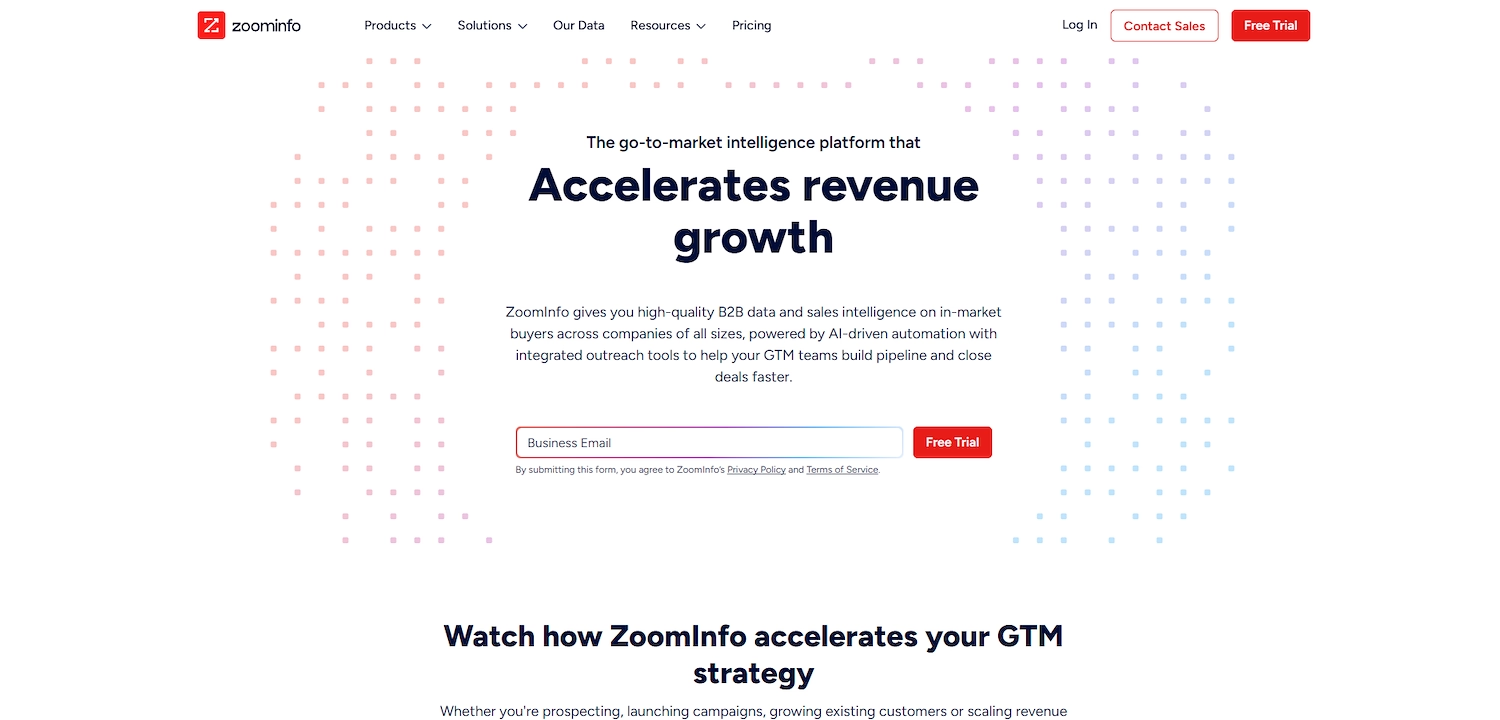
ZoomInfo SalesOS is a go-to-market platform for B2B organizations. It offers a unified system with contact and company data, buyer-intent signals, and automation tools. This helps teams identify and connect with potential buyers.
You can use it to build prioritized lead lists with verified contact information. The platform also supports campaign launches and helps identify in-market accounts to engage across different channels.
ZoomInfo SalesOS's Main Features
- Accesses real-time intent signals to find prospects who are ready to purchase.
- Analyzes call and meeting interactions to provide insights.
- Provides a generative-AI companion to surface insights and draft outreach messages.
- Triggers go-to-market activities automatically based on set criteria.
How ZoomInfo SalesOS Compares to LimeLeads
Average Review Score: 4.5/5 stars based on 8,738 G2 reviews.
- ZoomInfo SalesOS offers real-time buyer intent signals to find active prospects. This is more dynamic than the static company lists found in LimeLeads.
- It includes a generative AI companion to suggest contacts and draft messages. This automates strategic work that is manual with LimeLeads data.
- The platform analyzes sales calls and meetings to provide coaching insights. Such a feature for performance improvement is absent in LimeLeads.
- Its database is frequently refreshed for higher data accuracy. This addresses the outdated information that can be an issue with LimeLeads.
Potential Downsides Of ZoomInfo SalesOS
- ZoomInfo SalesOS requires a larger budget and a longer setup time of about one month. This is different from LimeLeads, which often serves teams that need a more immediate and less costly data source.
- The tool's broad scope is sometimes less effective for hyper-local business searches. LimeLeads may offer a more direct database for teams that target specific local companies.
- Some users report that contact information can be inaccurate. This shows that even with a large platform, data quality can be a concern, similar to issues noted with other providers.
Pricing and Cost Considerations
ZoomInfo SalesOS pricing is available by quote and is considered a premium option, reflecting its extensive features. This places it at a higher price point than LimeLeads, which serves teams with more limited budgets. For exact costs, you will need to contact the ZoomInfo sales team.
2) Apollo.io
Apollo.io is a sales intelligence and engagement platform. It provides access to a large B2B contact database and includes tools for outreach. This combination helps sales teams manage the entire sales cycle, from prospecting to customer engagement, within a single system.
Apollo.io's Main Features
- Offers a database with over 275 million contacts and 73 million companies.
- Includes a sequence builder to automate email and call campaigns.
- Provides a Chrome extension for finding contact data on LinkedIn and company websites.
- Features analytics to track sequence performance and team activity.
How Apollo.io Compares to LimeLeads
Average Review Score: 4.8/5 stars based on 9,571 G2 reviews.
- Apollo.io combines data with engagement tools. LimeLeads focuses on providing contact lists, which requires separate tools for outreach.
- It offers a free plan and transparent pricing tiers. This makes it accessible for smaller teams or those testing a new platform.
- The platform includes automation features like email sequencing. This helps manage outreach at scale, a function not native to LimeLeads.
- Apollo's database is broader in scope. LimeLeads may provide more focused data for users targeting hyper-local or niche business types.
Potential Downsides Of Apollo.io
- The platform's extensive features can present a learning curve for new users. Getting the most out of the tool may require some initial training.
- Some users report occasional inaccuracies in contact data. This is a common challenge for data platforms, but it can affect campaign success.
- The credit system for obtaining contacts and sending emails can be complex. Teams may need to monitor usage carefully to stay within limits.
Pricing and Cost Considerations
Apollo.io has a free plan that provides limited credits. Paid plans start at around $49 per user per month, offering more credits and features. This pricing structure makes it a more scalable option than LimeLeads for growing teams.
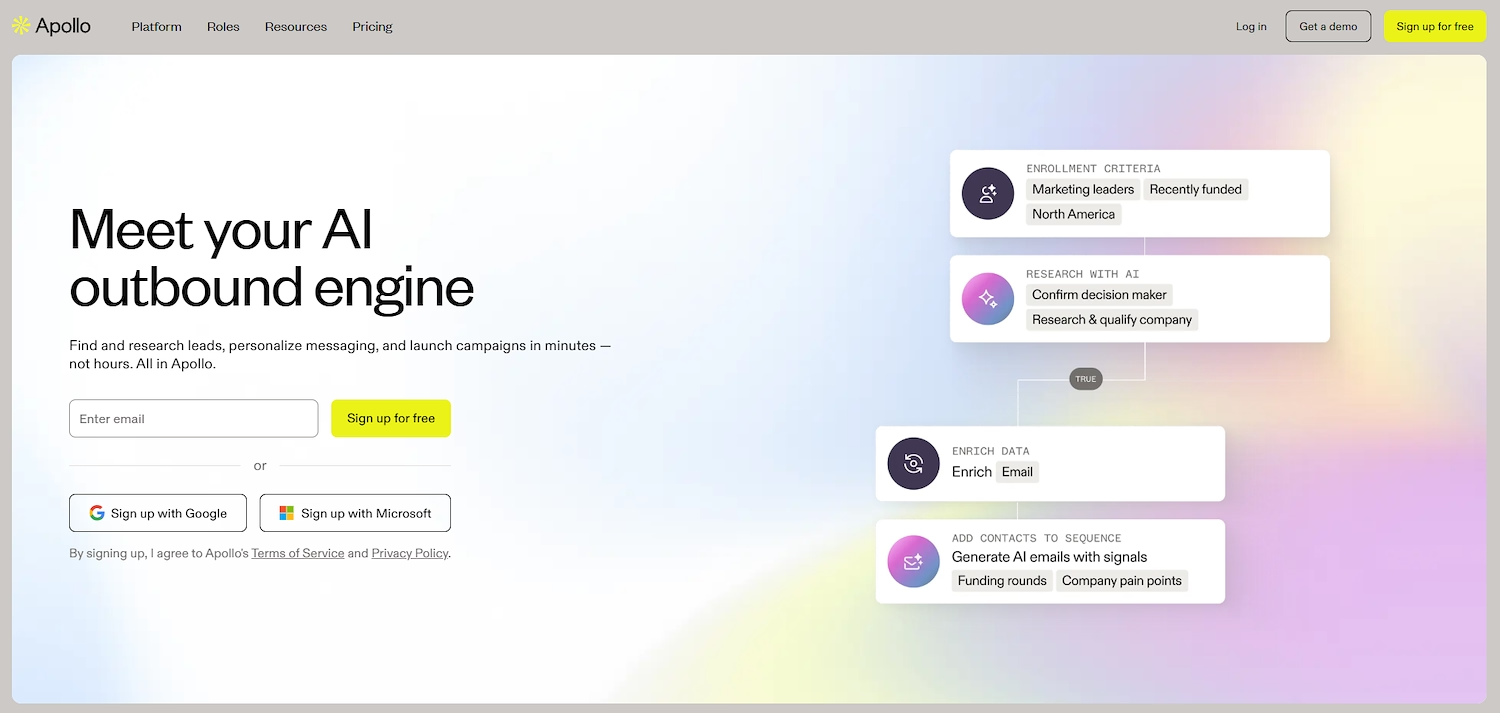
3) Lusha
Lusha is a sales intelligence platform that gives B2B sales professionals access to accurate contact and company data. You get direct phone numbers and email addresses to assist with lead generation, data enrichment, and targeted outreach.
The tool works with popular CRMs and has a browser extension to find prospects online. Its main goal is to help shorten sales cycles and increase conversion rates for your team.
Lusha's Main Features
- Provides access to direct phone numbers and email addresses for B2B contacts.
- Integrates with popular CRMs to enrich existing data within your workflow.
- Offers a browser extension to find prospect information on websites and professional networks.
How Lusha Compares to LimeLeads
Average Review Score: 4.3/5 stars based on 2,108 G2 reviews.
- Lusha provides both direct dials and email addresses, while LimeLeads focuses more on company-level data which may not always include direct contact details.
- It offers a browser extension that finds contact data on websites and LinkedIn, a feature for real-time prospecting that is different from using LimeLeads' static lists.
- The platform integrates with popular CRMs to enrich existing records automatically, which helps maintain an updated database compared to the manual data uploads from LimeLeads.
- Lusha operates on a credit-based system with a free starting plan, offering a flexible way to access data that differs from the bulk data-purchase model of LimeLeads.
Potential Downsides Of Lusha
- Lusha's database is broad, which can make it less effective for finding hyper-local businesses. LimeLeads, in comparison, offers more specialized data for users who target specific local markets.
- The credit-based model can be restrictive for large data projects. Teams that need many contacts at once may find the bulk data purchase model of LimeLeads more direct.
- Its primary focus is on individual contact details. For market research that requires deep company-level data, LimeLeads may provide a more fitting dataset.
Pricing and Cost Considerations
Lusha offers a free plan for individual users and paid tiers based on a monthly subscription. This credit-based model provides more flexibility for scaling teams compared to LimeLeads' bulk data purchase approach. For specific pricing details, you can visit Lusha's website.
3) Hunter
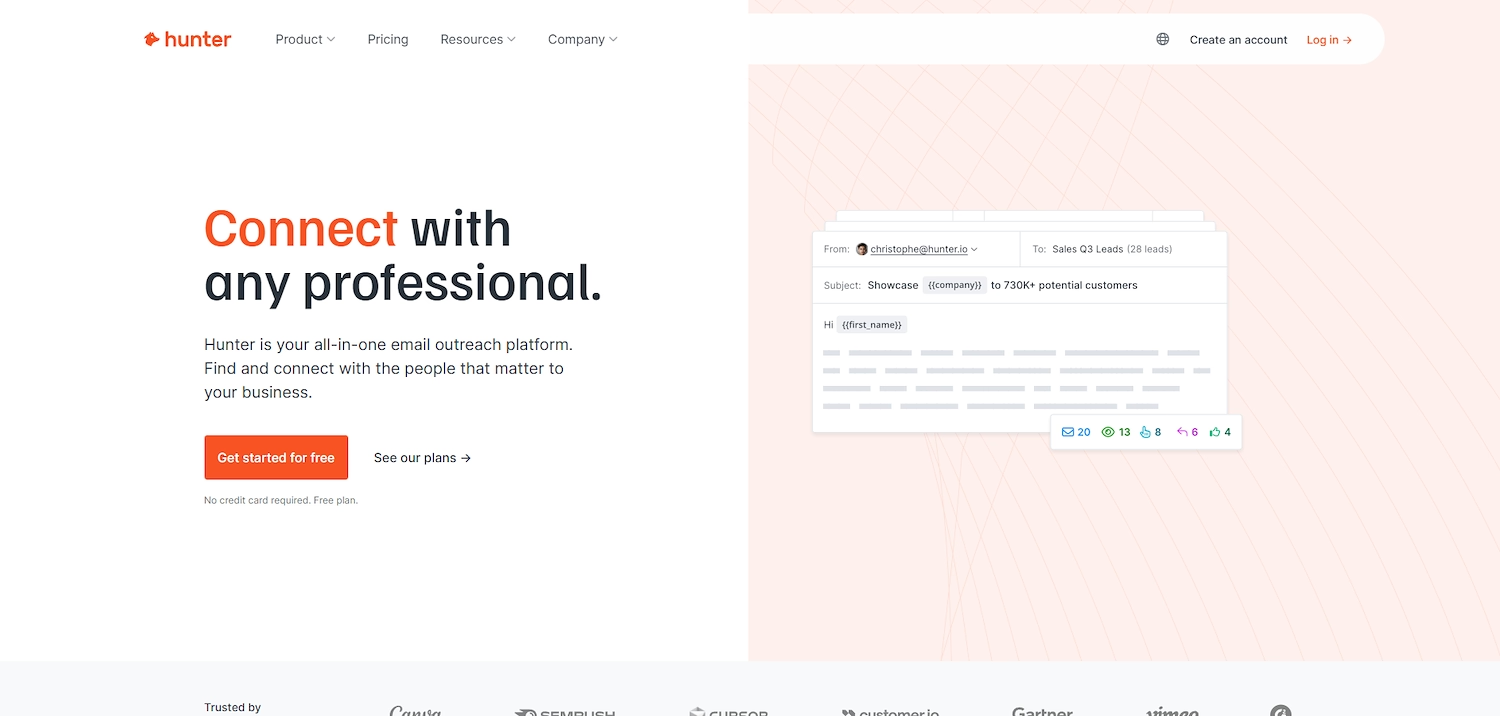
Hunter is an all-in-one platform for email outreach and lead generation. It helps businesses identify B2B prospects and locate their verified email addresses. The service allows users to run cold-email campaigns and validate email lists to reduce bounces. It uses proprietary technology and AI to help build targeted prospect lists and keep data compliant with regulations.
Hunter's Main Features
- Finds verified email addresses using a person's name and company domain.
- Verifies email lists in bulk to reduce bounce rates and protect sender reputation.
- Includes a cold-email suite for composing messages, scheduling follow-ups, and sending from a Gmail or Outlook account.
- Identifies websites based on the technology stack they use.
How Hunter Compares to LimeLeads
Average Review Score: 4.4/5 stars based on 592 G2 reviews.
- Hunter has an email verification tool to clean lists and reduce bounces. LimeLeads provides lists but requires a separate tool for this level of verification.
- It includes a platform to send cold email campaigns. This is an outreach feature that LimeLeads does not have, as it focuses only on data.
- The tool can find a specific person's email with just their name and company. This is a more direct search method than looking through the general business lists from LimeLeads.
- Hunter allows you to search for companies based on the technology they use. This provides a different way to build prospect lists compared to LimeLeads.
Potential Downsides Of Hunter
- Hunter focuses on finding individual emails, which can be less direct for building lists of local businesses. LimeLeads, in comparison, provides a database that is often more specialized for users targeting specific local markets.
- The tool's primary function is email discovery, not providing deep company-level data. For market research that requires extensive company information, LimeLeads may offer a more suitable dataset.
- Its credit-based subscription can be less straightforward for large, one-time data projects. Some users may find the bulk data purchase model of LimeLeads more direct for acquiring a large volume of contacts at once.
Pricing and Plan Details
Hunter offers a subscription model with a free plan and paid tiers starting at $49 per month, which provides predictable costs for ongoing use. This contrasts with LimeLeads' bulk-purchase model, better suited for large, one-time data projects. For a complete breakdown, see the pricing on Hunter's official website.
4) UpLead
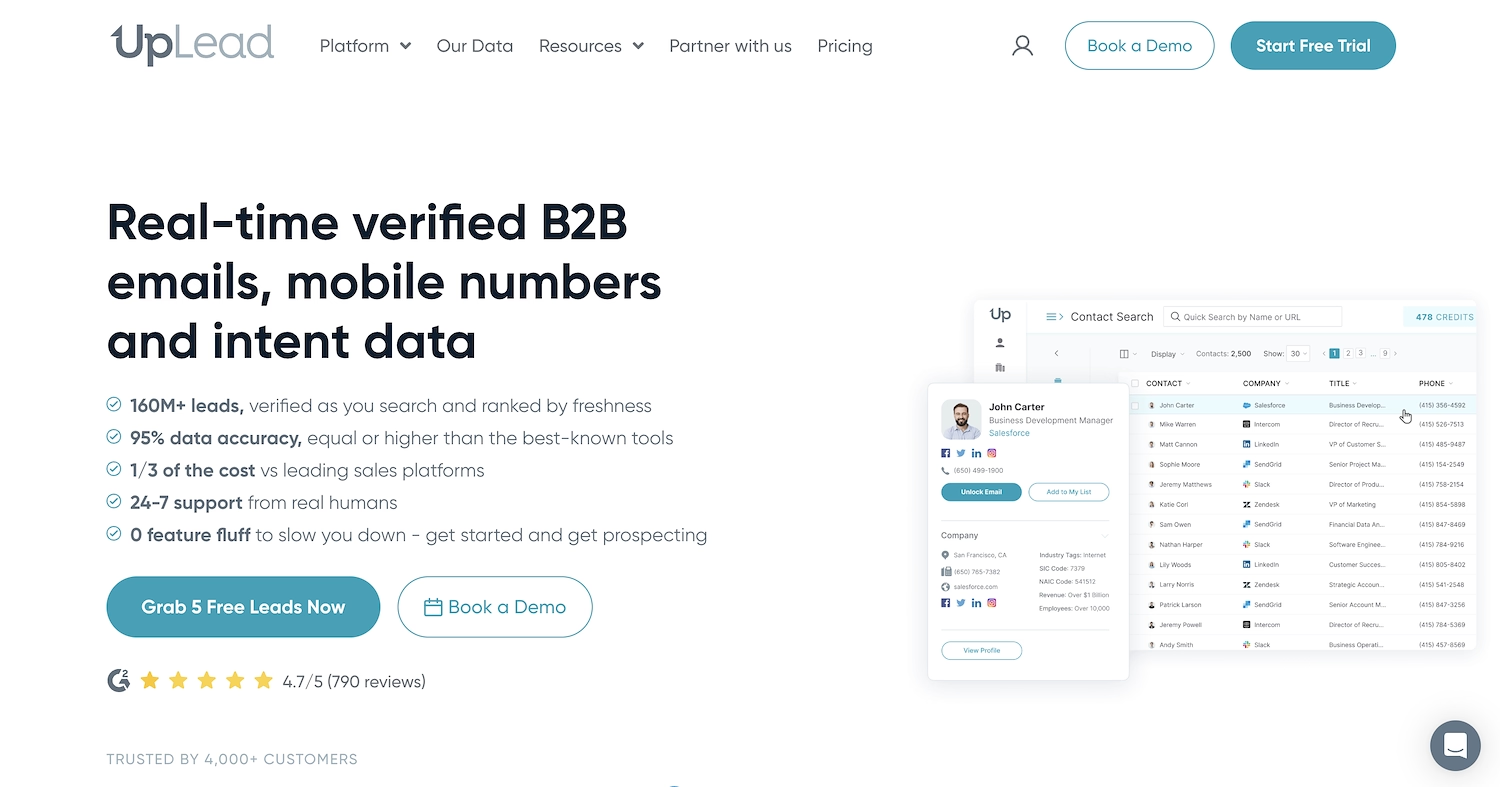
UpLead is a B2B data provider that offers contact and company information. It helps you build prospect lists from a database that includes local businesses, which you can sort by industry and location.
The platform also adds details to your existing records and emphasizes data accuracy.
UpLead's Main Features
- Provides buyer intent data to surface prospects who are actively researching your solution.
- Tracks over 16,000 technologies used by companies for targeted outreach.
- Verifies emails in real-time upon export and offers a 95% data accuracy guarantee.
- Enriches existing CRM records with over 40 data points to prevent stale data.
How UpLead Compares to LimeLeads
Average Review Score: 4.7/5 stars based on 797 G2 reviews.
- UpLead verifies emails in real-time and offers a 95% data accuracy guarantee, which addresses the potential for outdated information sometimes found in LimeLeads' static lists.
- It provides buyer intent data to identify prospects who are actively researching solutions, a feature not available in LimeLeads, which focuses on general company lists.
- The tool allows you to search for companies based on the technology they use, offering a different targeting approach than LimeLeads' location and industry filters.
- UpLead enriches existing CRM records with fresh data, while LimeLeads is primarily used to build new prospect lists rather than update current ones.
Potential Downsides Of UpLead
- UpLead has a broad database which sometimes makes it less effective for finding hyper-local businesses. LimeLeads, in contrast, offers a more specialized focus on local company data.
- The platform operates on a subscription model with credits. This can be less straightforward for large, one-time data acquisitions, where the bulk-purchase model of LimeLeads is more direct.
- Its wide range of features, such as intent data, might be complex for users who only need a simple contact list. LimeLeads provides a more direct database experience for basic needs.
Pricing and Cost Considerations
UpLead offers a free trial and paid plans starting at $99 per month. This subscription model provides predictable costs for ongoing use, unlike LimeLeads' bulk-purchase approach, which is more suited for large, one-time data acquisitions.
5) Lead411
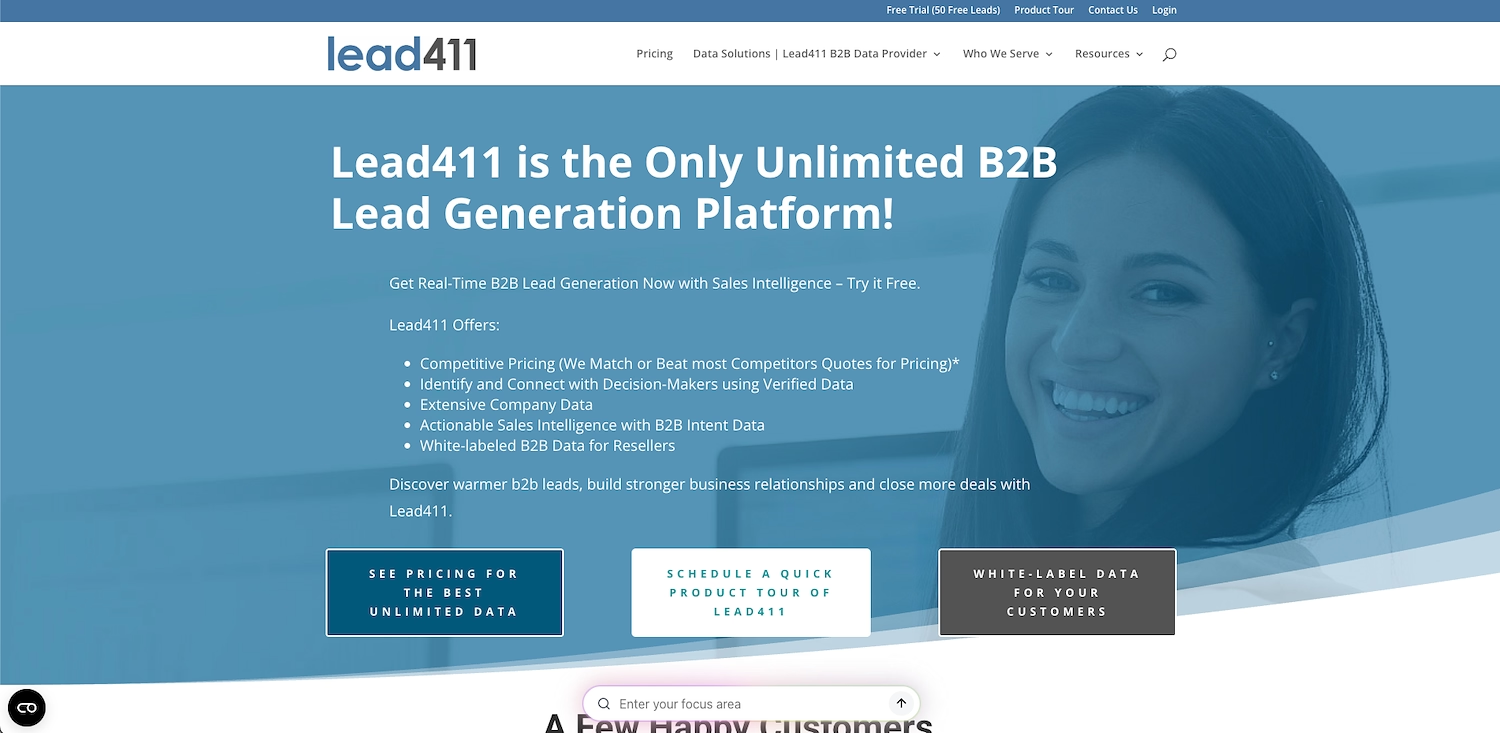
Lead411 is a sales intelligence platform for B2B companies. It provides contact and company data to help sales teams build prospect lists. Users can search for information to support outreach campaigns, with a focus on details relevant to their target market, such as local businesses.
Lead411's Main Features
- Provides growth and buyer-intent data using native signals and a Bombora integration.
- Sends trigger alerts for events such as funding rounds, personnel changes, and hiring.
- Includes a sales-engagement module to send emails, track replies, and manage cadences.
- Offers a lead scoring and AI dashboard to surface high-priority accounts.
How Lead411 Compares To LimeLeads
Average Review Score: 4.5/5 stars based on 466 G2 reviews.
- Lead411 provides buyer-intent data to identify companies actively researching solutions, which is different from the general company lists in LimeLeads.
- It sends trigger alerts for company events like funding rounds, offering timely outreach opportunities that are not available with LimeLeads' static data.
- The platform includes a sales engagement module to manage email campaigns, whereas LimeLeads requires a separate tool for outreach.
- Its AI dashboard scores leads to surface high-priority accounts, providing a more guided process compared to building lists manually with LimeLeads.
Potential Downsides Of Lead411
- Lead411 offers a broad database, which sometimes is less direct for hyper-local business searches. In comparison, LimeLeads provides a more specialized focus on local company data for specific markets.
- The tool operates on a subscription basis, which might be less suitable for one-time data acquisitions. LimeLeads offers a bulk-purchase model that can be more direct for teams with large, single-project data needs.
- Its advanced features, such as intent data and an AI dashboard, can introduce complexity for users who only need a simple contact list. LimeLeads offers a more straightforward database experience for basic needs.
Cost and Plan Comparison
Lead411 offers a subscription model with its Basic plan priced at $75 per user per month. This provides predictable costs for ongoing use, contrasting with LimeLeads' bulk-purchase model, which is better suited for large, one-time data projects.
Automate Your Sales with 11x
If your goal is to automate sales functions, 11x provides digital workers for tasks like lead research and outreach. This allows your sales team to focus on deal closure. You can explore how this system integrates with your existing workflow.
With 11x, we run your sales playbook. Alice finds prospects, enriches their data, and handles outreach. Julian qualifies inbound leads and schedules meetings. We replace separate tools for intent data, enrichment, and outreach by combining them into one platform.
Book a demo to see 11x in action.
6) Clearbit
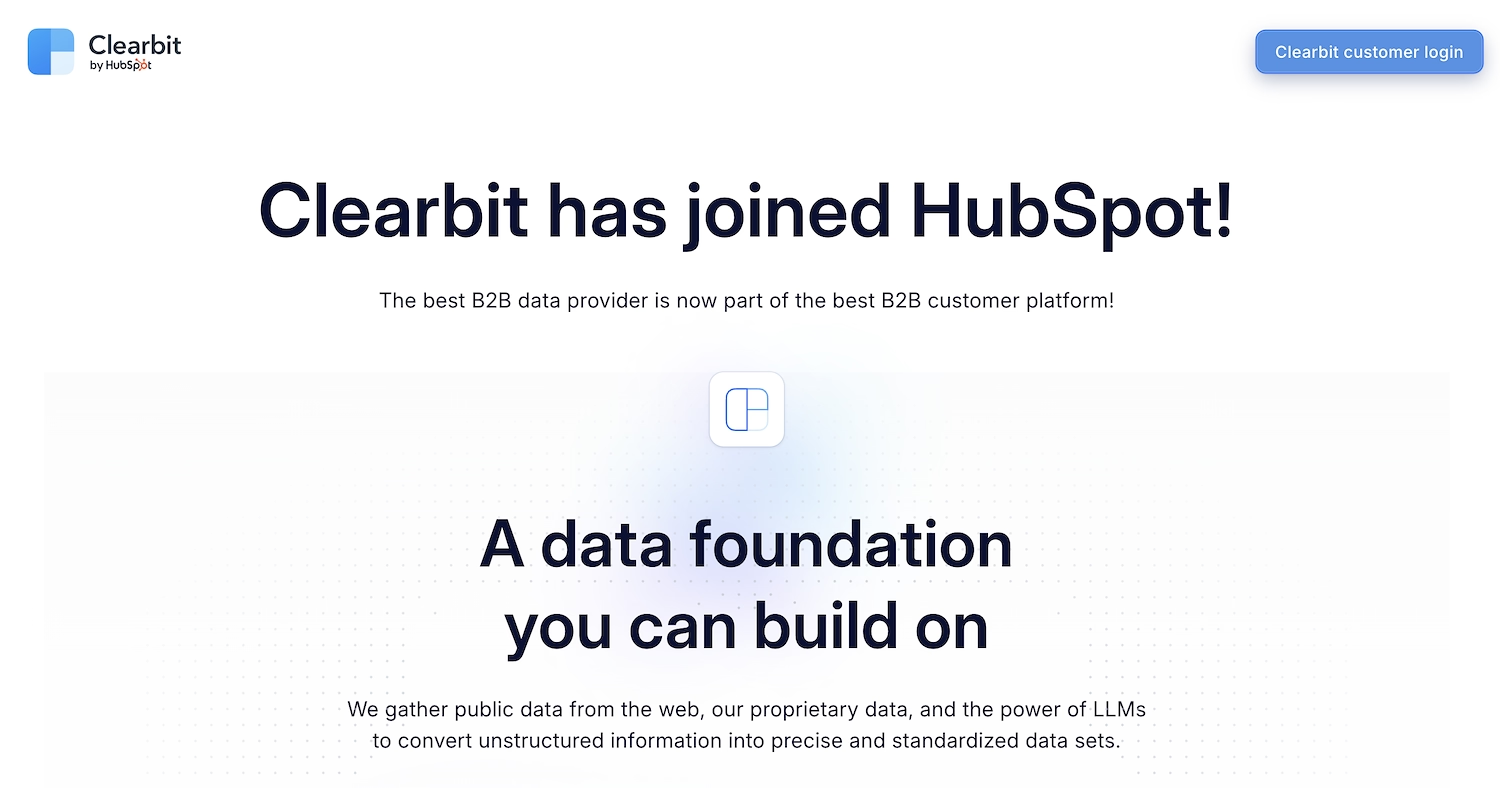
Clearbit is a marketing data platform for B2B companies. It provides company and contact information to help teams understand customers and find new prospects.
The platform's data can enrich your systems and help you identify accounts that show purchase intent. This supports targeted marketing and sales efforts.
Clearbit's Main Features
- Aggregates public web data and proprietary sources using LLM techniques to create standardized B2B datasets.
- Enriches lead, contact, and account records with details like 6-digit NAICS codes and corporate hierarchy.
- De-anonymizes website traffic to reveal which visiting companies match your ideal customer profile.
- Shortens web forms by automatically enriching data, which helps increase lead conversion rates.
How Clearbit Compares To LimeLeads
Average Review Score: 4.4/5 stars based on 626 G2 reviews.
- Clearbit enriches your existing records with over 100 data points. This is different from LimeLeads, which focuses on providing new contact lists.
- It identifies anonymous companies that visit your website. This provides a source of warm leads, whereas LimeLeads offers static lists of cold prospects.
- The platform can shorten web forms by auto-filling data for visitors. This helps increase lead conversion rates, a feature not available with LimeLeads' data-only approach.
- Clearbit integrates directly into CRMs to automate data workflows. This is a more connected approach compared to manually importing lists from LimeLeads.
Potential Downsides Of Clearbit
- Clearbit's focus is on enriching existing records, which can be less direct for building new lists of local businesses from scratch. LimeLeads, in contrast, provides a database more specialized for users who target local markets.
- The platform's subscription model is designed for ongoing data integration. For teams that need a large volume of contacts for a single project, the bulk-purchase option from LimeLeads can be more straightforward.
- Its features center on data enrichment and identifying website visitors. Users who only need a simple contact list may find the direct database experience of LimeLeads more suitable for their needs.
Pricing and Cost Considerations
Clearbit's pricing is quote-based, reflecting its subscription model for ongoing data integration. This contrasts with LimeLeads' bulk-purchase approach. For the most accurate and up-to-date pricing information, you can check the details on Clearbit's official website.
7) RocketReach
RocketReach is a platform used to find contact information for professionals. It provides access to a large database of emails and phone numbers, which helps with sales, recruiting, and marketing outreach.
RocketReach's Main Features
- Offers a database of over 700 million profiles across 35 million companies.
- Includes a browser extension to find contact information on company websites and social networks.
- Provides an API to integrate contact discovery into other applications.
- Allows for bulk lookups to enrich lists of contacts or companies.
How RocketReach Compares To LimeLeads
Average Review Score: 4.5/5 stars based on 466 G2 reviews.
- RocketReach's browser extension allows for real-time contact discovery on websites. This is different from LimeLeads, which provides pre-compiled static lists.
- It focuses on individual professional contacts with direct emails and phone numbers. LimeLeads is more centered on general company data, especially for local businesses.
- The platform has a large, global database of individuals. LimeLeads often provides a more specialized dataset for users who target specific local markets.
Potential Downsides Of RocketReach
- The platform's focus on individual contacts may be less effective for users who need to build comprehensive lists of local businesses. LimeLeads can be more direct for this purpose.
- Some users report that contact information can occasionally be outdated. This is a common issue for large-scale data providers.
- Its credit-based subscription model may be less direct for large, one-time data projects compared to LimeLeads' bulk-purchase option.
Pricing and Cost Considerations
RocketReach uses a subscription model with plans starting around $53 per month, based on the number of lookups. This provides predictable costs for ongoing use, unlike the bulk-purchase model of LimeLeads, which is better for single projects.
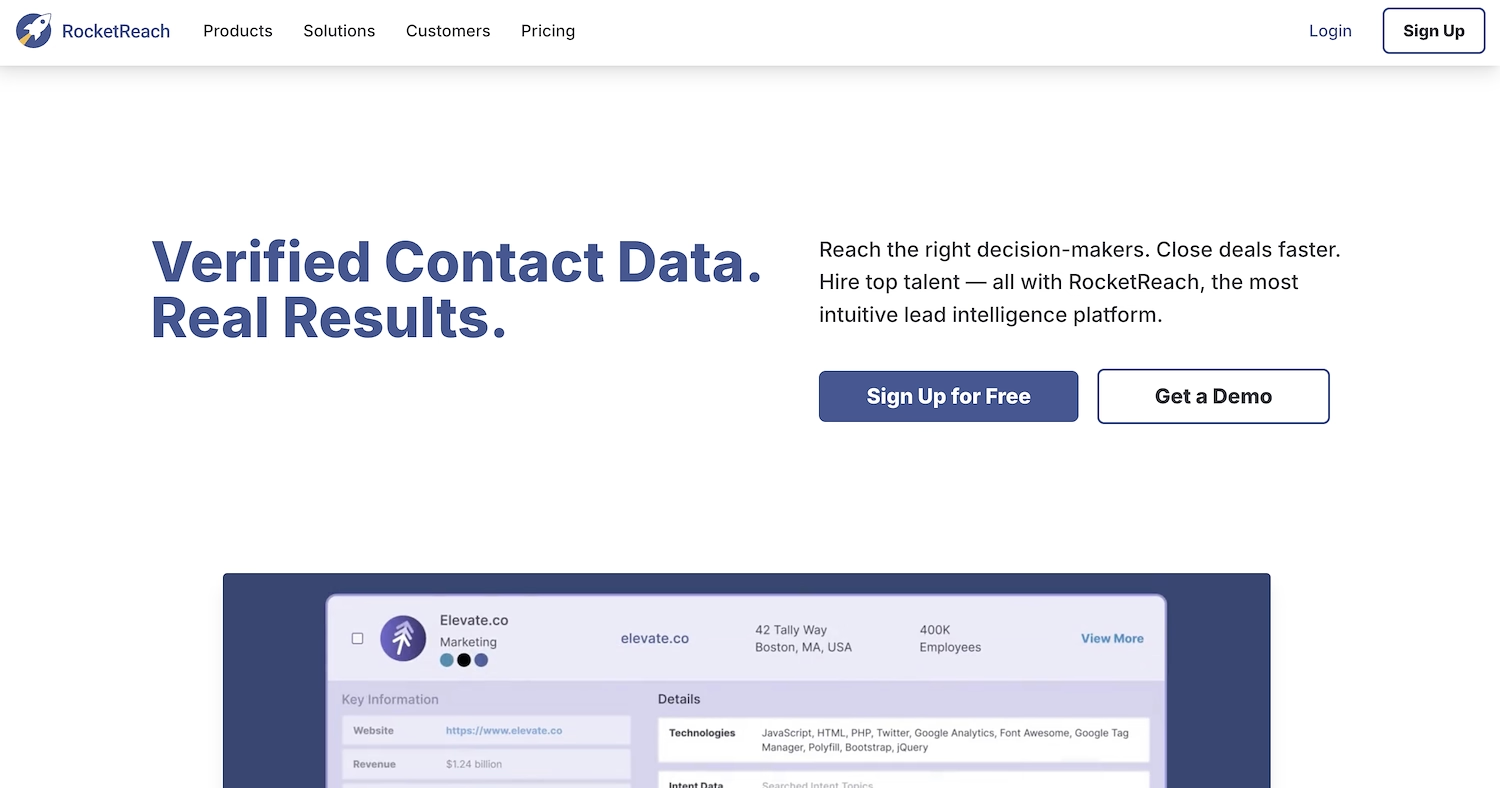
RocketReach provides contact information for professionals. Its database contains over 700 million profiles across 35 million companies, with emails and phone numbers. Teams use this data for sales outreach, recruitment, and marketing campaigns.
RocketReach's Main Features
- Offers a database of over 700 million profiles across 35 million companies.
- Includes a browser extension to find contact information on company websites and social networks.
- Provides an API to integrate contact discovery into other applications.
- Allows for bulk lookups to enrich lists of contacts or companies.
How RocketReach Compares To LimeLeads
Average Review Score: 4.4/5 stars based on 918 G2 reviews.
- RocketReach offers a browser extension to find contact data on websites in real time, which is different from the static lists LimeLeads provides.
- It provides an API to integrate contact discovery into other applications, while LimeLeads data often requires manual export and import.
- The tool allows for bulk lookups to enrich existing contact lists, a feature that differs from LimeLeads' primary focus on building new prospect lists.
- Its database contains over 700 million individual professional profiles globally, whereas LimeLeads centers more on company-level data for local businesses.
Potential Downsides Of RocketReach
- RocketReach focuses on individual professionals, so it is less direct for lists of local businesses compared to LimeLeads' specialized company database.
- The tool centers on individual contact details, so it may not be the best fit for market research that requires the deep company-level data available through LimeLeads.
- Its credit-based subscription can be less straightforward for large, one-time data projects compared to the bulk-purchase model that LimeLeads offers.
Pricing and Plan Details
RocketReach offers paid plans starting at $99 per month for 100 lookups, providing predictable costs for ongoing use. This subscription model contrasts with LimeLeads' bulk-purchase approach, which is better suited for large, one-time data projects.
8) Seamless.AI
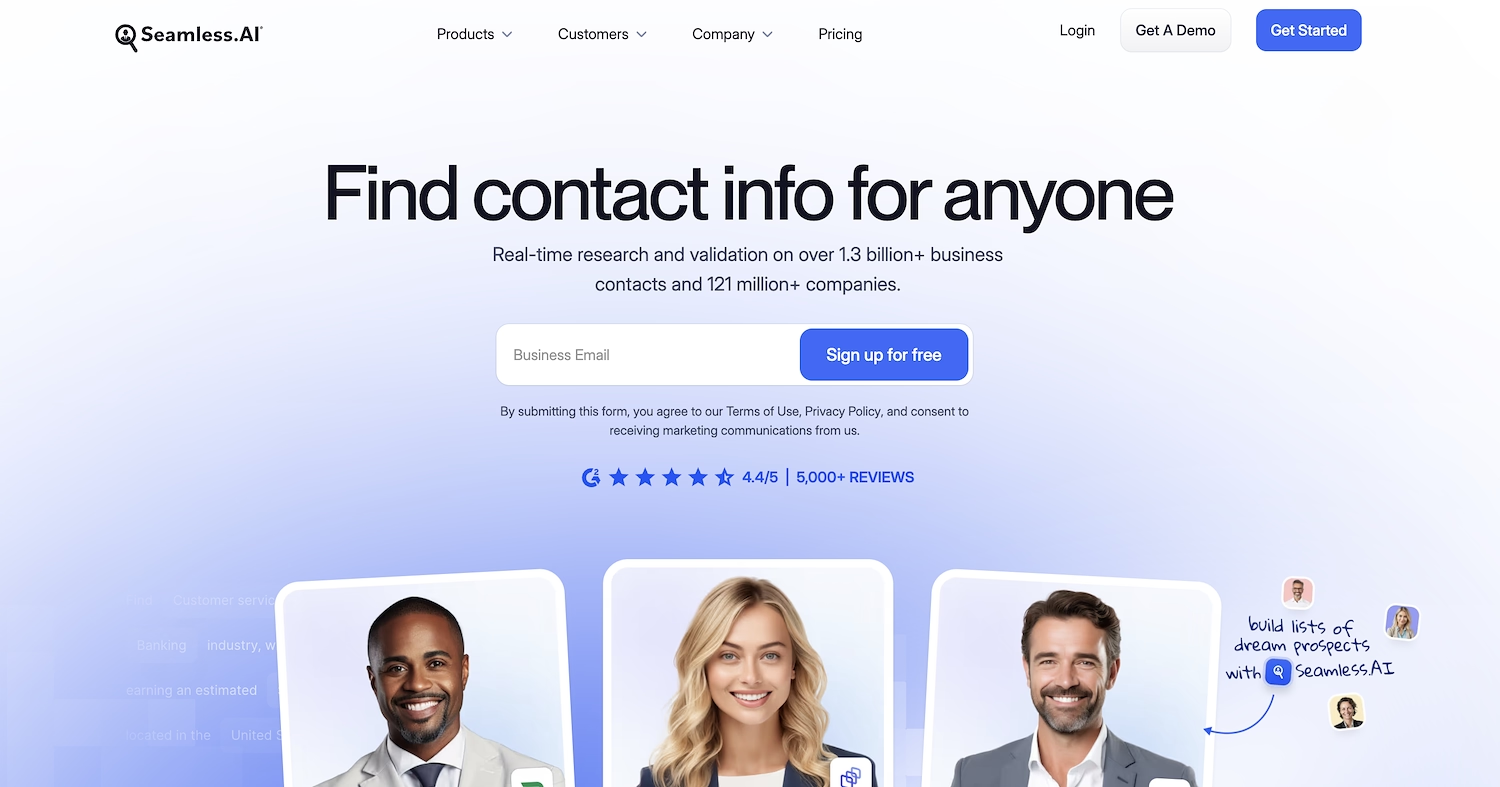
Seamless.AI is a sales intelligence platform that provides B2B contact and company data. Sales teams use the tool to build prospect lists with verified phone numbers and emails. The platform's database includes information on local businesses, which supports targeted outreach to specific markets.
Seamless.AI's Main Features
- Uses a real-time search engine to find verified emails and cell phone numbers.
- Provides buyer intent data and tracks job changes to identify sales triggers.
- Enriches contact and company profiles with sales insights to maintain data accuracy.
- Integrates with CRMs like Salesforce and HubSpot to automate list building.
How Seamless.AI Compares to LimeLeads
Average Review Score: 4.4/5 stars based on 5,067 G2 reviews.
- Seamless.AI uses a real-time search engine to find contact data. This is different from LimeLeads, which offers static lists that may be outdated.
- It provides buyer intent data and tracks job changes to signal timely sales triggers. LimeLeads does not offer this type of dynamic information.
- The platform integrates with CRMs like Salesforce and HubSpot to automate list building. This is a more connected approach than the manual data imports from LimeLeads.
- Seamless.AI finds verified emails and direct cell phone numbers for individuals. This provides a more direct contact path than the general company-level data common in LimeLeads.
Potential Downsides Of Seamless.AI
- Seamless.AI has a broad database, which is sometimes less effective for users who need hyper-local business data. In comparison, LimeLeads offers a more specialized database for specific local markets.
- The tool operates on a subscription model. This might be less direct for large, one-time data projects, where the bulk-purchase option from LimeLeads can be more straightforward.
- It focuses on individual contact details. For market research that needs deep company-level data, LimeLeads may provide a more suitable dataset.
Pricing and Cost Considerations
Seamless.AI offers a subscription model, which contrasts with LimeLeads' bulk-purchase approach. For specific pricing details, you should visit Seamless.AI's official website as costs are provided by quote.
9) Lusha
Lusha is a sales intelligence tool that provides B2B contact data. It offers direct phone numbers and email addresses for sales professionals. The platform helps with finding leads and enriching data for outreach campaigns. It also integrates with CRMs and offers a browser extension.
Lusha's Main Features
- Access to direct phone numbers and email addresses of B2B contacts.
- CRM integrations to enrich data inside your existing systems.
- A browser extension to find contact information on websites and social networks.
How Lusha Compares to LimeLeads
Average Review Score: 4.3/5 stars based on 2,108 G2 reviews.
- Lusha offers direct dials and emails, while LimeLeads centers on company-level data that may lack direct contact details.
- Its browser extension allows for real-time data collection, unlike the static lists from LimeLeads.
- Lusha integrates with CRMs for automatic data enrichment, versus manual uploads from LimeLeads.
- It uses a credit-based system with a free plan, which provides more flexibility than LimeLeads' bulk-purchase model.
Potential Downsides Of Lusha
- Some users may find its broad database less effective for hyper-local searches compared to LimeLeads' specialized local data.
- The credit system can be a limitation for large, one-time data projects, where LimeLeads' bulk purchase model might be more suitable.
- Its focus on individual contacts may not be ideal for research requiring deep company-level data, which LimeLeads provides.
Pricing and Cost Considerations
Lusha has a free plan and paid subscription tiers. The credit-based model offers flexibility for scaling teams, unlike LimeLeads' bulk-purchase option. For exact pricing, you should check Lusha's website.
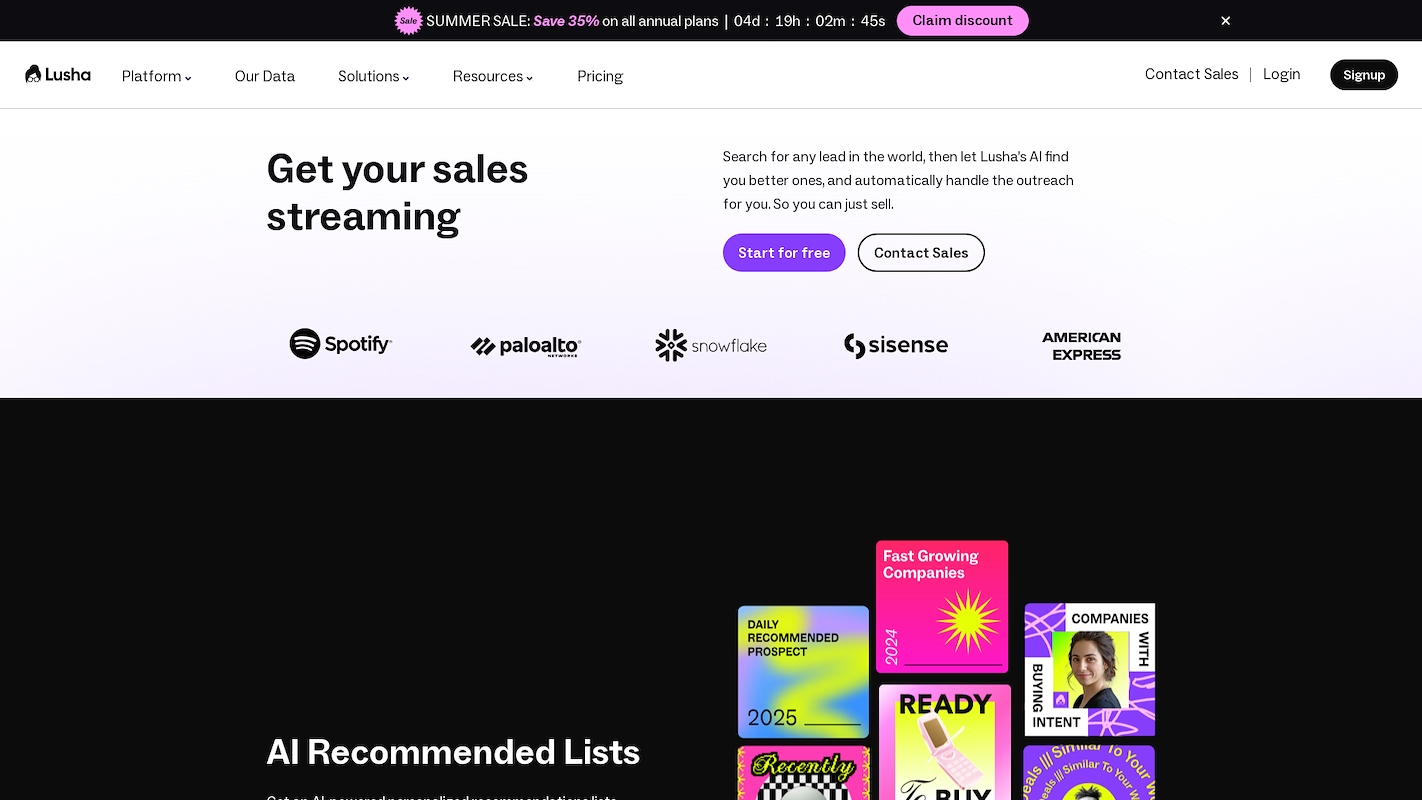
Lusha is a sales intelligence tool that provides B2B contact data. It offers direct phone numbers and email addresses for sales professionals to support outreach campaigns. The platform helps find leads and enrich data through CRM integrations and a browser extension for websites and social networks.
Its database is broad, so it may be less direct for hyper-local business searches than more specialized tools.
Lusha's Main Features
- Provides access to contact, company, and industry research data.
- Cleans and enriches existing data records to maintain accuracy.
- Manages user roles and access permissions for team administration.
How Lusha Compares To LimeLeads
Average Review Score: 4.3/5 stars based on 1,516 G2 reviews.
- Lusha provides direct phone numbers and email addresses for contacts, offering a more direct path for outreach compared to the general company data common in LimeLeads.
- The platform uses AI Prospect Playlists to automatically generate and refresh lead lists, a more dynamic approach than building static lists with LimeLeads.
- It integrates with CRMs to clean and enrich existing records automatically, which helps maintain an updated database compared to the manual data uploads from LimeLeads.
- Its browser extension finds contact data on websites and social networks in real time, which is different from using the pre-compiled lists from LimeLeads.
Potential Downsides Of Lusha
- For teams that target specific local businesses, Lusha's global database might require more effort to narrow down. LimeLeads provides lists that are already focused on local markets, which can be a more direct solution.
- The platform is built to find individual contacts, which is less ideal for broad market analysis. LimeLeads, by comparison, offers company-centric data that better supports research on industry segments or geographical business landscapes.
- Its credit-based plans are designed for ongoing use, which may not suit a one-off data acquisition project. Some users might find the bulk data purchase from LimeLeads is a simpler option for a single, large list.
Pricing and Cost Considerations
Lusha offers a free plan and paid tiers starting at $36 per user per month, a subscription model that contrasts with LimeLeads' bulk-purchase approach for one-time projects. For complete pricing details, you can visit Lusha's official website.
10) Cognism
Cognism is a sales intelligence platform that provides B2B contact and company data. It helps sales and marketing teams find prospect information while maintaining compliance with data privacy laws. The platform is used to build contact lists and enrich existing records.
Cognism's Main Features
- Provides verified B2B contact data, including mobile numbers and email addresses.
- Offers buyer intent data to identify accounts actively researching solutions.
- Includes a browser extension for finding contact information on corporate websites and LinkedIn.
- Checks data against Do-Not-Call lists to support compliant outreach.
How Cognism Compares to LimeLeads
Average Review Score: 4.6/5 stars based on 1,178 G2 reviews.
- Cognism provides buyer intent data, which helps identify active prospects. This is a dynamic feature not found in LimeLeads' static company lists.
- It focuses on providing data that is checked for compliance with GDPR and CCPA. This is a specific focus that differs from a general data provider like LimeLeads.
- The platform includes a browser extension for real-time prospecting. This is different from using the pre-compiled lists that LimeLeads offers.
- Cognism offers verified mobile numbers, providing a more direct contact method than the general company information often found in LimeLeads.
Potential Downsides Of Cognism
- Cognism is a premium-priced tool, which may not be suitable for teams with smaller budgets. LimeLeads often serves as a more cost-effective option.
- The platform's extensive features can be more than what is needed for users who only require simple contact lists. LimeLeads offers a more direct database experience.
- While its database is global, some users may find LimeLeads offers more specialized data for hyper-local business searches within the US.
Pricing and Cost Considerations
Cognism uses a subscription model with pricing available by quote, placing it at a higher price point than LimeLeads. This model is designed for ongoing use, which contrasts with the bulk-purchase option from LimeLeads that suits one-time data projects.
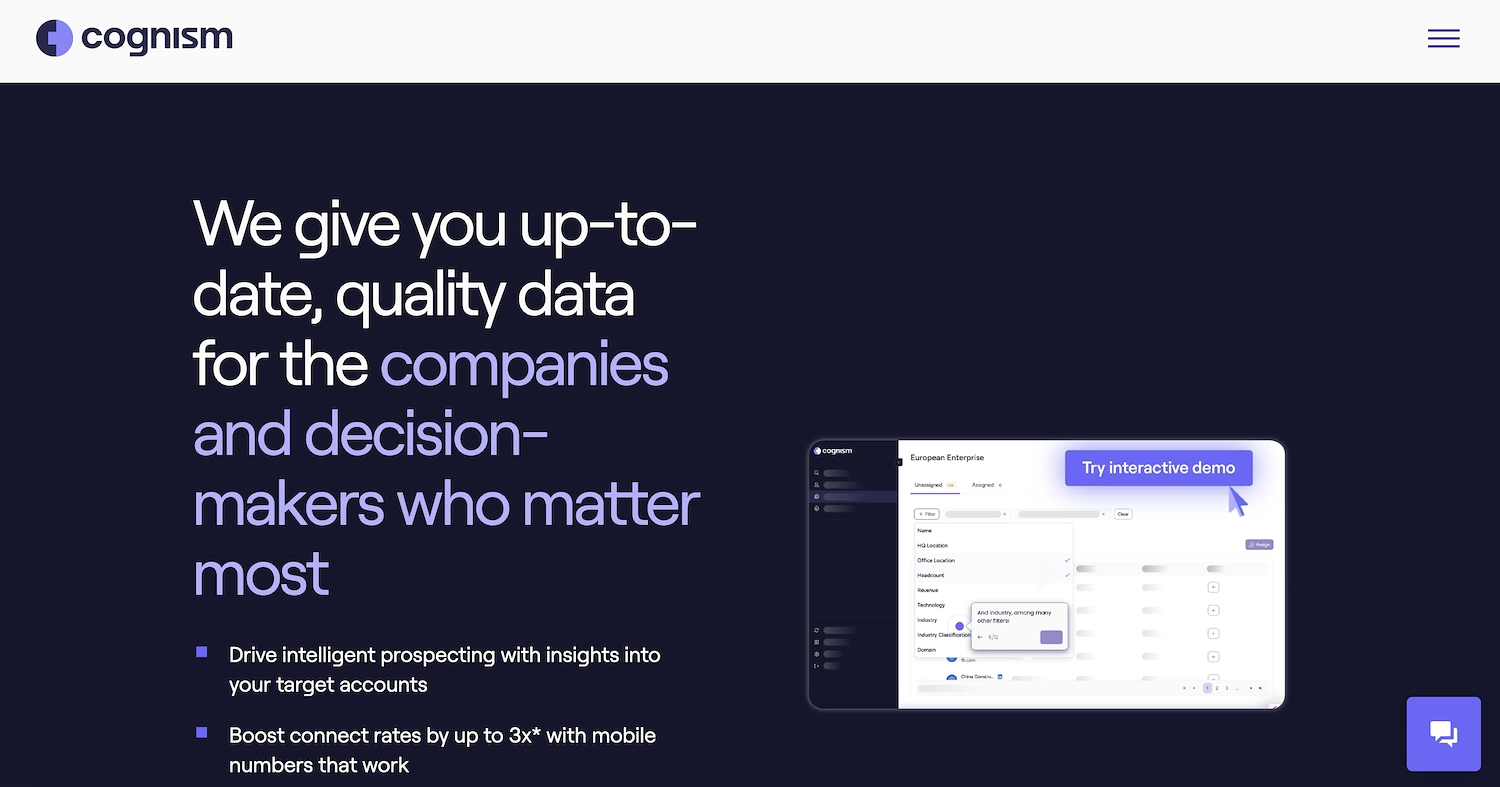
Cognism is a sales intelligence platform that offers B2B contact and company data. Sales and marketing teams use it to find prospect information and follow data privacy laws. The platform can build contact lists or enrich your existing records with new details.
Cognism's Main Features
- Provides access to contact, company, and industry research data.
- Cleans and enriches existing data records to maintain accuracy.
- Integrates with CRM and marketing automation systems.
- Offers lead intelligence and validation to assess lead quality.
How Cognism Compares To LimeLeads
Average Review Score: 4.6/5 stars based on 1,033 G2 reviews.
- Cognism cleans and enriches existing data records to maintain accuracy. This is different from LimeLeads, which is primarily used to build new prospect lists rather than update current ones.
- It integrates directly with CRM and marketing automation systems. This provides a more connected workflow compared to the manual data imports required with LimeLeads.
- The platform offers lead intelligence and validation to help assess lead quality. This gives more insight than the raw contact lists provided by LimeLeads.
- This tool provides access to industry research data, which supports broader market analysis. LimeLeads, in comparison, centers more on providing lists of local businesses for targeted outreach.
Potential Downsides Of Cognism
- Cognism's strength is cleaning and enriching existing data records. For teams that need to build new prospect lists from the ground up, LimeLeads provides a more direct tool for that specific purpose.
- The platform integrates directly into CRM systems, which requires some setup. Users who prefer to manually import a simple list may find LimeLeads' approach faster for their needs.
- It provides access to broad industry research data. This is less focused than LimeLeads, which centers on providing targeted lists of local businesses for direct outreach campaigns.
Pricing and Cost Considerations
Cognism operates on a subscription model with custom pricing, which is generally higher than LimeLeads' bulk-purchase option. For an exact quote based on your needs, you should visit Cognism's official website.
Which One Should You Go With?
Choosing a LimeLeads alternative depends on your team's specific needs, budget, and workflow. This guide reviewed several options to help you find a suitable replacement for your sales process.
If you want to automate sales functions, 11x offers digital workers for lead research and outreach. This approach combines data, enrichment, and engagement into a single platform, allowing your team to focus on closing deals.




